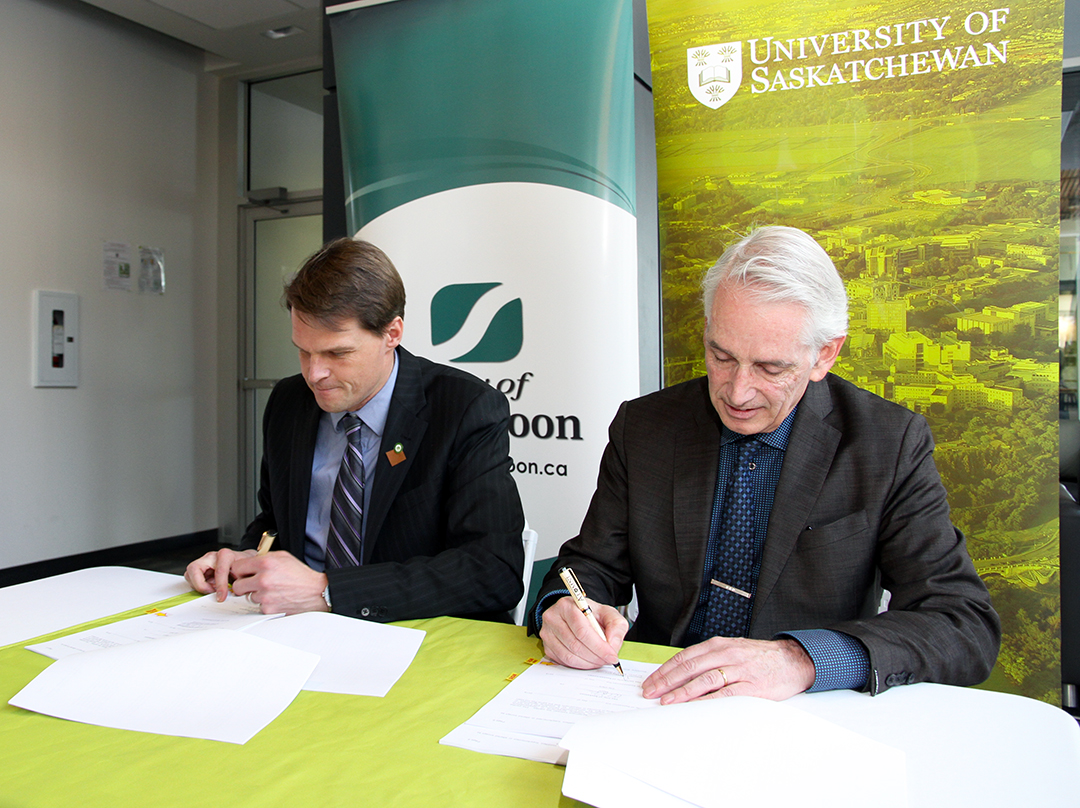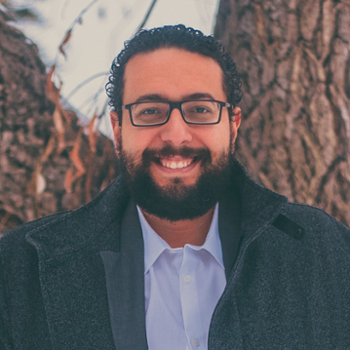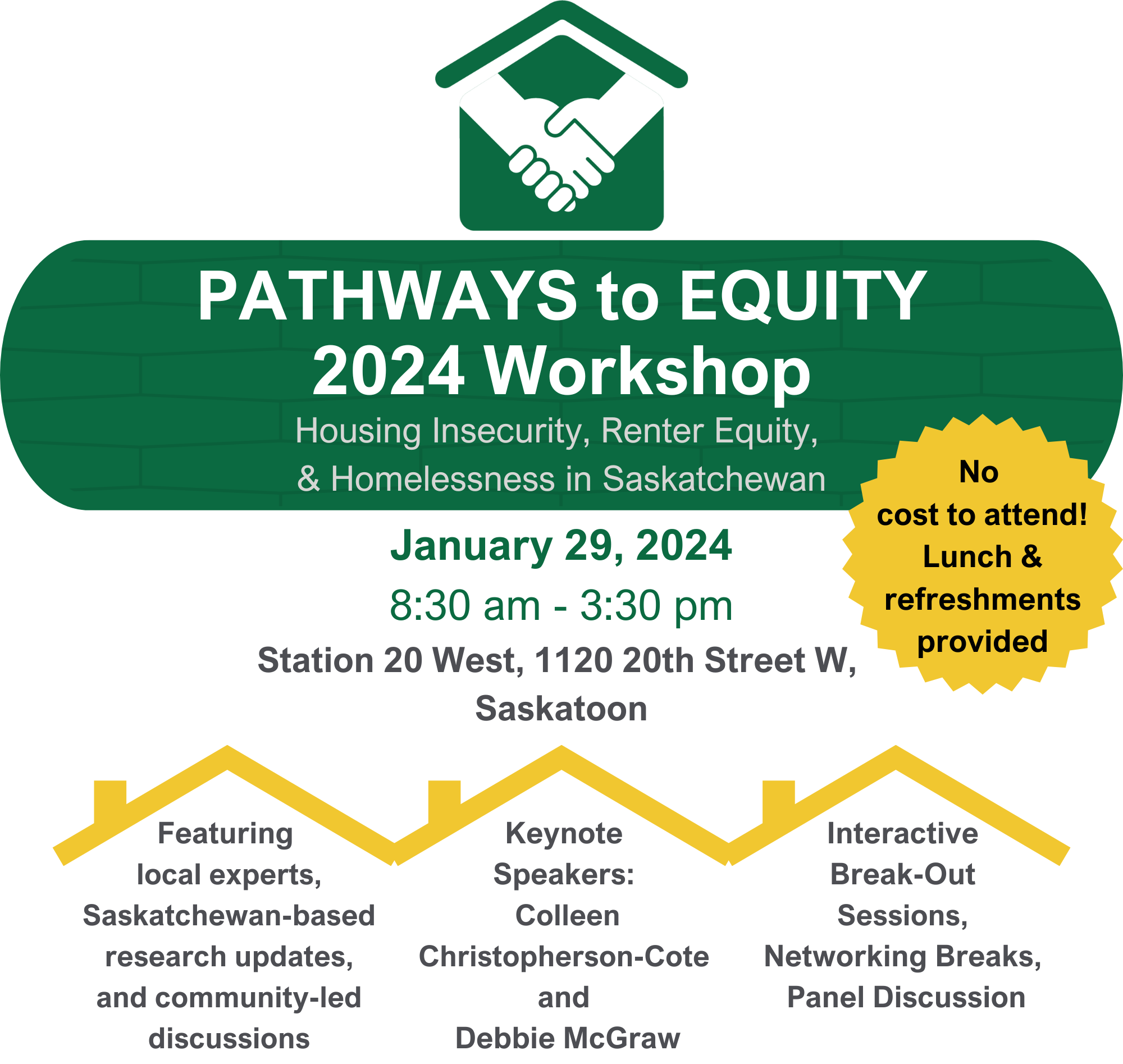About
Pathways to Equity is a research initiative that explores cross-agency and cross-disciplinary research in the areas of homelessness, social justice, education, and health across the province of Saskatchewan. The initiative includes funding for community-engaged research projects, workshops and events. The current thematic focus of Pathways of Equity is on housing and homelessness.
We acknowledge that different communities experience and understand homelessness differently. Knowing that people experiencing homelessness are not defined by their situation, we fully support their ability to define their own experience in a way that respects their dignity.
Pathways is concerned primarily with issues of equity and factors of personal and community wellbeing. It assumes research methodologies that have a genuine partnership with the communities being served and a commitment to 'close the loop' so people in society benefit directly from the University's activity.
The Pathways to Equity Mission Statement
"To raise levels of equity and wellbeing through focused, thematic areas of research conducted in direct partnerships with the knowledge and experience of our communities and committed to bringing results back to participants and decision-makers in those communities."
Pathways to Equity is funded through an anonymous donor.
Working Group
Membership of the Working Group includes USask faculty members and community members with representation from individuals, community organizations, and persons with lived experience. The group will strive for a balance between university and community members.
Members of the working group will build research capacity amongst USask faculty and community partners and will raise awareness of the Pathways to Equity Initiative.
Events
Join us for the 2024 Pathways to Equity Workshop on Housing insecurity, Renter Equity, and Homelessness in Saskatchewan. This workshop will bring together researchers, students, community members and service providers to connect, learn and inform.
Featuring local experts, participants can expect to learn about Saskatchewan-based research updates and participate in community-led discussions. Our keynote speakers are local experts Colleen Christopherson-Cote and Debbie McGraw.
Accessibility:
Please reach out to pathways.equity@usask.ca or call 306-966-7295 with any accessibility requirements, including transportation within Saskatoon, or to speak to someone for registration information or support.
Pathways to Equity is a donor-sponsored research initiative.

2021 Pathways to Equity Workshop: Housing Insecurity, Renter Equity & Homelessness
In November 2021, Pathways to Equity hosted a workshop to explore cross-agency and cross-disciplinary research in the areas of homelessness, housing insecurity, and renter equity. By bringing together faculty, community leaders, and those with lived experience with housing insecurity and homelessness, we set the stage for ongoing conversations and determined the next steps to engage in meaningful research projects.
This highly interactive workshop included break-out groups, a panel discussion, and featured keynote speakers Michèle Biss and Sahar Raza from the National Right to Housing Network.
Outcomes of the workshop led to three new research projects funded by Pathways to Equity.
Regional Spotlight Video Series
As a supplement to the workshop on housing insecurity and homelessness, the Pathways to Equity team interviewed community organizers from across the province to learn about the state of homelessness in Saskatchewan. These interviews were published as the Regional Spotlight Video Series on Homelessness.
If you would like to learn more about homelessness in Saskatchewan, please check out the following videos!
Jolon Lafond & Ian Bear
Donna Brooks & June Anonson
Leigh Landry & Sydney Boulton
Funded Projects
USask College of Law associate professor Sarah Buhler is working closely with Chantelle Johnson, executive director of Community Legal Assistance Services for Saskatoon Inner City Inc. (CLASSIC), on the project, “Access to Justice for Renters in Saskatchewan.”
The project, which seeks to identify barriers renters face in trying to access appropriate legal resources when it comes to fighting for their housing rights.
Dr. Brenda Mishak (PhD) from USask’s College of Nursing and Jason Mercredi with Métis Nation–Saskatchewan (MN–S) are leading a project aimed at addressing rising homelessness in rural and northern Saskatchewan. The project will create concrete datasets at the community level would have a significant impact and will engage with attendees at Back to Batoche Days in 2023.
USask dental public health specialist Keith Da Silva and the Community-University Institute for Social Research (CUISR) led by co-directors USask professor emerita Isobel Findlay and the City’s senior planner Bill Holden, will examine access to dental care and how it may enhance quality of life for Saskatoon’s homeless population and those living in poverty. The ultimate goal is to reduce poverty by alleviating some social symptoms of poor oral health: lowered self-esteem, limited social interaction, and reduced employability.
USask women and gender studies researcher Marie Lovrod will work with City housing analyst Michael Kowalchuk and OUTSaskatoon executive director Rachel Loewen Walker, a queer and sexuality studies specialist. This team will study the success of OUTSaskatoon’s Pride Home, a five-bed home for 2SLGBTQ youth. 2SLGBTQ youth are at high risk for housing insecurity and consequently have increased physical and mental health challenges. The aim of the project is to create an evidence-based model for reducing queer youth homelessness to be shared across Canada.
News
USask initiative funds projects studying homelessness, housing security

USask and City of Saskatoon partner to tackle urban issues

SASKATOON — The University of Saskatchewan (USask) and the City of Saskatoon are partnering on a new program to help solve challenging urban issues through the power of research collaboration.
Resources
The Canadian Observatory on Homelessness is the largest national research institute devoted to homelessness in Canada. The COH is the steward of the Homeless Hub.
The Homeless Hub is a web-based research library and information centre representing an innovative step forward in the use of technology to enhance knowledge mobilization and networking.
Making the Shift contributes to the transformation of how we respond to youth homelessness through research and knowledge mobilization specific to youth homelessness prevention and housing stabilization.
The Point-in-Time (PiT) Counts are a community-level measure of sheltered and unsheltered homelessness. It also provide a national picture of homelessness.
Point-in-Time (PIT) Homelessness Counts are key resources that gather data to help understand factors in homelessness, to give a human face to the statistics, and to help design and implement effective program and policy investments and interventions.
https://cuisr.usask.ca/documents/publications/2015-2019/CUISR_PIT2018_JULY%204TH_2019.pdf
The Saskatchewan Human Rights Commission's public report brings together many renters' systemic equity concerns.
https://saskatchewanhumanrights.ca/wp-content/uploads/2020/03/SHRC_RIRPA_web.pdf
The availability of pet-friendly rental housing is limited in Saskatoon, Saskatchewan. We know from documented experiences in other North American cities that increasing the availability of pet-friendly rental housing can be beneficial to both tenants and rental property owners. As a tenant, understanding your rights and obligations when renting with your pet is an important part of being a responsible pet caretaker. As a property owner, pet-friendly properties can increase interest from potential tenants and if tenants have pets they often stay longer.
The Guide is available online: https://colleendell.com/guide
Contact
Meaghan Risling
Programs Coordinator, Research Acceleration and Strategic Initiatives
306-966-7295












